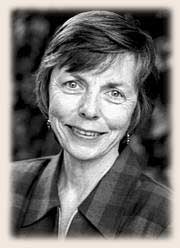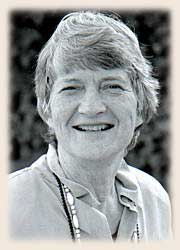| SOIL,
FOOD, & PEOPLE CONFERENCE
March 27-29, 2000
GROW BIOINTENSIVE conference on the U.C. Davis campus
Home
| Intro | Presentations
| Breakout Sessions | Friends:
Old & New | Sponsors
PRESENTATIONS
Nutrition
Kate Clancy | Joan
Dye Gussow
 |
Kate Clancy is the Director of
the Wallace Institute for Alternative Agriculture. Before joining
the Institute 3 years ago, she had spent 15 years on the faculty
of the Department of Nutrition and Food Service Management at
Syracuse University. |
Clancy spoke about the 3 major health and nutrition
problems in the world, taken from an article, "Underfed and
Overfed," which appeared in Issue #150 of WorldWatch. These
problems are lack of calories, lack of micronutrients, and overeating.
She feels that iron is the biggest micronutrient problem and that
most micronutrient lack is due to little variety in the diet.
Clancy stated that obesity in essence is caused by nutritional
transition. She said that anyone who moves to a city will increase
his/her consumption of sweets by 100 percent, no matter the level
of income or physical activity. There is also a higher intake of
fats and meat.
When traditional people come as immigrants to the U.S. and start
to make money, they experience a change of diet and in the process,
often lose their health. She notes that in China during a four-year
period, the number of people eating a high-fat diet went from 23%
to 67%.
Another factor in diet change is the changing role of women. When
women work out of the home, there is often a lessened focus on food.
She feels it is important to encourage the return to or retention
of traditional diets.
Clancy cites poverty as being responsible for a lack of calories,
or malnutrition. She says this is basically due to poor people lacking
access to land. She believes there is plenty of food being produced
in the world now and the real problem is to defeat poverty.
She thinks the answer to this is to create farming and marketing
systems which are rooted in the community. Because small-scale,
or traditional, agriculture is labor-intensive, these systems will
provide jobs, produce fresh food for market and also create raw
materials for value-added products.
top
 |
Joan Dye Gussow is the Mary Swartz
Rose professor emeritus of nutrition and education at Teachers
College, Columbia University, where she formerly headed the
Department of Nutrition Education. |
Gussow reminisced about meeting John Jeavons in
Palo Alto and watching the food being weighed at the garden there.
She said she appreciates the work that Ecology Action has done so
that others can know nutritional facts about food, such as the fact
that a nutritionally complete diet can be grown in a very small
area.
She noted that adequate calories are the most
difficult nutritional element to grow in a small area, as is vegetable
oil. Gussow has spent the last 5 years growing vegetables on 990
square feet and says that she grows many more vegetables than she
can eat. She plans to intensify her production so that she can also
grow food for the soil.
Gussow feels that our planet is showing signs
of terminal illness and that the current global food system is not
sustainable. Food travels great distances and is tasteless, but
most American consumers do not know this because they have lost
their sense of taste. She believes that things will have to change,
and that when they do, Americans and people in other developed countries
will have the hardest time adjusting.
She said that Americans are accustomed to having
whatever foods they want at any time of the year and views food
education as being a "Rushmorian" task. Her own personal
choice for re-educating people is to invite others to dinner so
they can experience a different kind of diet of fresh food. Some
of the statements made by Clancy and Gussow during questions from
the audience were:
- Encourage people to garden. People who garden
will change their diet.
- There should be a signal that will turn off
the TV and on the screen place a sign saying, "Think."
- It is important to teach gardening in schools,
not only how to grow food, but how to cook it.
top |